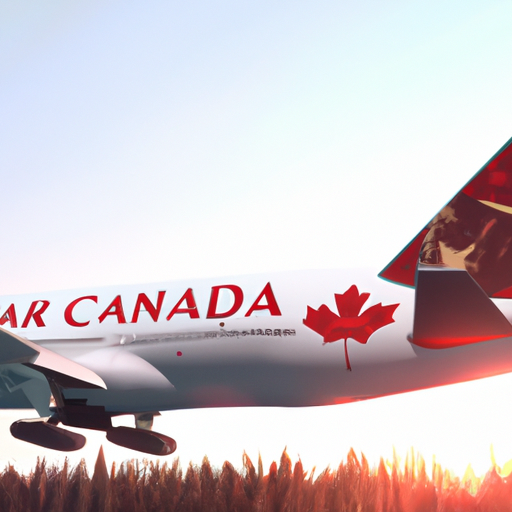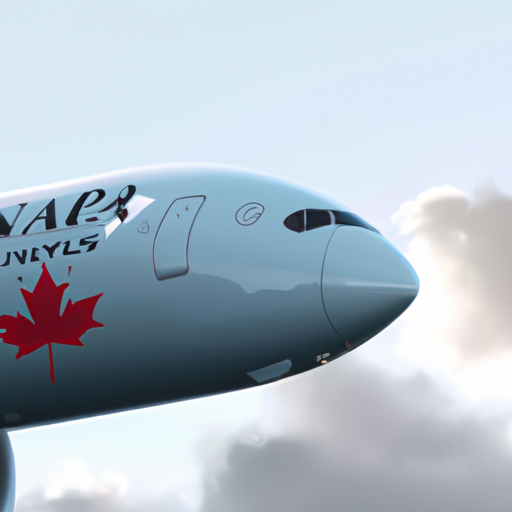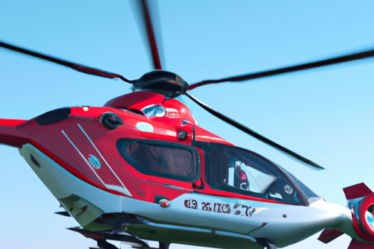
Benefits of Air Canada’s new Boeing 787-10 fleet
Air Canada, the country’s largest airline, has recently made some exciting updates to its fleet. The airline has placed an order for 18 Boeing 787-10 Dreamliners, while also canceling its order for 777 freighters. This move is expected to bring numerous benefits to Air Canada and its passengers.
One of the key advantages of the new Boeing 787-10 fleet is its fuel efficiency. These aircraft are designed to consume less fuel compared to older models, resulting in significant cost savings for the airline. This, in turn, can lead to more affordable ticket prices for travelers. Additionally, the reduced fuel consumption also means a smaller carbon footprint, aligning with Air Canada’s commitment to sustainability.
Another benefit of the Boeing 787-10 is its enhanced passenger experience. The aircraft is equipped with state-of-the-art technology and features that prioritize comfort and convenience. Passengers can expect larger windows, allowing for more natural light and breathtaking views during the flight. The cabin is also designed to have a quieter environment, reducing noise levels and enhancing the overall travel experience.
Furthermore, the Boeing 787-10 offers improved air quality and humidity levels. The advanced air filtration system ensures cleaner air circulation throughout the cabin, reducing the risk of airborne illnesses and allergies. The higher humidity levels help combat the dryness often experienced during long flights, keeping passengers feeling refreshed and comfortable.
In terms of capacity, the Boeing 787-10 is a game-changer for Air Canada. With its larger size, the aircraft can accommodate more passengers, allowing the airline to meet growing demand and offer more flight options. This increased capacity also means more opportunities for travelers to secure their preferred seats and travel dates.
The new fleet will also enable Air Canada to expand its route network. With the Boeing 787-10’s long-range capabilities, the airline can explore new destinations and connect travelers to more parts of the world. This expansion opens up a world of possibilities for both leisure and business travelers, providing them with more choices and flexibility when planning their trips.
Moreover, the Boeing 787-10 is equipped with the latest in-flight entertainment systems. Passengers can enjoy a wide selection of movies, TV shows, music, and games, ensuring a pleasant and entertaining journey. The aircraft also offers Wi-Fi connectivity, allowing travelers to stay connected with their loved ones or catch up on work while in the air.
In conclusion, Air Canada’s decision to update its fleet with the Boeing 787-10 Dreamliners brings numerous benefits to both the airline and its passengers. The fuel efficiency, enhanced passenger experience, increased capacity, and expanded route network all contribute to a more enjoyable and convenient travel experience. With these new additions, Air Canada is well-positioned to continue providing exceptional service and connectivity to travelers around the world.
Impact of Air Canada’s cancellation of 777 Freighters

Air Canada, one of the leading airlines in North America, recently made a significant announcement regarding its fleet. The airline has decided to update its fleet by ordering 18 Boeing 787-10s, while simultaneously canceling its order for 777 Freighters. This decision has sparked interest and speculation among aviation enthusiasts and industry experts alike.
The cancellation of the 777 Freighters order by Air Canada is expected to have a notable impact on the airline’s operations. The 777 Freighters are large cargo aircraft that are specifically designed for long-haul flights, offering a substantial cargo capacity. With the cancellation of these aircraft, Air Canada will have to reassess its cargo operations and find alternative solutions to meet the demand for freight transportation.
One of the immediate effects of this cancellation is the potential loss of cargo capacity for Air Canada. The 777 Freighters were capable of carrying a significant amount of cargo, and their absence from the fleet will undoubtedly create a void. This could lead to challenges in meeting the needs of customers who rely on Air Canada for their cargo transportation requirements.
However, it is important to note that Air Canada’s decision to cancel the 777 Freighters order is not without reason. The airline has likely conducted a thorough analysis of its cargo operations and determined that the demand for freight transportation does not justify the acquisition of these aircraft. This decision could be a strategic move to optimize the airline’s resources and focus on areas of its business that are more profitable and in higher demand.
Furthermore, the cancellation of the 777 Freighters order does not necessarily mean that Air Canada will completely abandon its cargo operations. The airline will likely explore alternative options to meet the cargo transportation needs of its customers. This could involve partnerships with other cargo carriers or the utilization of existing aircraft in its fleet for cargo purposes. Air Canada has a strong reputation for adaptability and innovation, and it is highly likely that the airline will find creative solutions to address the challenges posed by the cancellation of the 777 Freighters order.
In addition to the impact on Air Canada’s cargo operations, the cancellation of the 777 Freighters order also has implications for Boeing, the manufacturer of these aircraft. Boeing has been facing significant challenges in recent years, particularly with the grounding of its 737 MAX aircraft. The cancellation of a major order like this from a prominent airline like Air Canada could further dent Boeing’s reputation and financial performance.
In conclusion, Air Canada’s decision to cancel its order for 777 Freighters will undoubtedly have an impact on the airline’s cargo operations. However, it is important to view this decision in the context of the airline’s overall strategy and the evolving demands of the aviation industry. Air Canada’s ability to adapt and find alternative solutions will be crucial in ensuring that its cargo operations continue to thrive. As for Boeing, the cancellation of this order serves as another challenge in an already difficult period for the aircraft manufacturer.
Air Canada’s fleet update strategy and its implications
Air Canada, the country’s largest airline, has recently made some significant updates to its fleet. In a move that highlights its commitment to modernization and sustainability, the airline has placed an order for 18 Boeing 787-10 Dreamliners. At the same time, it has decided to cancel its order for 10 Boeing 777 freighters. These decisions are part of Air Canada’s fleet update strategy, which aims to enhance passenger experience, improve fuel efficiency, and reduce its environmental footprint.
The addition of the Boeing 787-10 Dreamliners to Air Canada’s fleet is a significant step forward for the airline. This state-of-the-art aircraft offers numerous benefits, including increased fuel efficiency, improved range, and enhanced passenger comfort. With its larger size, the 787-10 will allow Air Canada to accommodate more passengers on long-haul routes, providing them with a more spacious and enjoyable travel experience.
One of the key advantages of the Boeing 787-10 is its fuel efficiency. The aircraft is equipped with advanced engines and aerodynamic features that significantly reduce fuel consumption compared to older models. This not only helps Air Canada reduce its operating costs but also contributes to a greener and more sustainable aviation industry. By investing in these fuel-efficient aircraft, Air Canada is taking a proactive approach to environmental stewardship.
In addition to its fuel efficiency, the Boeing 787-10 offers an extended range, allowing Air Canada to expand its network and reach new destinations. This is particularly important as the airline looks to recover from the impact of the COVID-19 pandemic and meet the evolving travel demands of its customers. The 787-10’s versatility and long-range capabilities make it an ideal choice for Air Canada’s future growth plans.
While the addition of the Boeing 787-10s is undoubtedly exciting news, Air Canada’s decision to cancel its order for Boeing 777 freighters may come as a surprise to some. However, this move aligns with the airline’s strategy to focus on passenger operations and optimize its cargo capacity through partnerships with dedicated cargo carriers. By leveraging these partnerships, Air Canada can ensure efficient and cost-effective cargo transportation while maintaining its primary focus on passenger travel.
The cancellation of the Boeing 777 freighters also reflects the changing dynamics of the global air cargo market. With the rise of e-commerce and the increasing demand for express delivery services, dedicated cargo carriers have emerged as key players in the industry. By partnering with these specialized carriers, Air Canada can leverage their expertise and infrastructure to provide seamless cargo services to its customers.
In conclusion, Air Canada’s fleet update strategy is a testament to its commitment to innovation, sustainability, and customer satisfaction. The addition of the Boeing 787-10 Dreamliners will enhance passenger experience, improve fuel efficiency, and expand the airline’s network. Simultaneously, the cancellation of the Boeing 777 freighters allows Air Canada to optimize its cargo operations through strategic partnerships. These decisions not only position Air Canada for future growth but also contribute to a greener and more sustainable aviation industry. As the airline continues to evolve and adapt to changing market dynamics, passengers can look forward to an even better travel experience with Air Canada.


